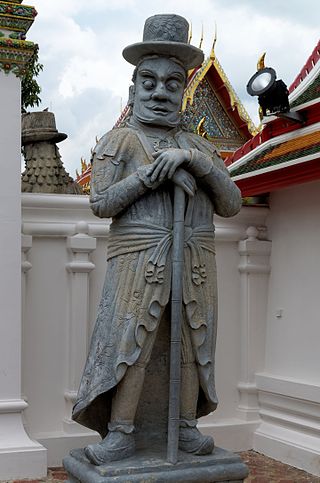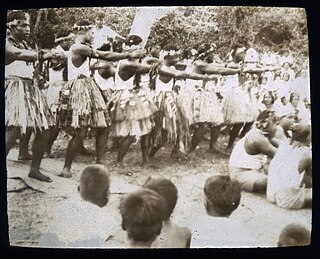Related Research Articles
Haole is a Hawaiian term for individuals who are not Native Hawaiian, and is applied to people primarily of European ancestry.

Farang is a Persian word that originally referred to the Franks and later came to refer to Western or Latin Europeans in general. The word is borrowed from Old French franc or Latin francus, which are also the source of Modern English France, French.

Pākehā is a Māori-language word used in English, particularly in New Zealand. It generally means a non-Polynesian New Zealander or more specifically a European New Zealander. It is not a legal term and has no definition under New Zealand law. Papa'a has a similar meaning in Cook Islands Māori.

Nigger: The Strange Career of a Troublesome Word is a 2002 book by Randall Kennedy of Harvard Law School about the history and sociology of the word nigger.
Gringo (masculine) or gringa (feminine) is a term in Spanish and Portuguese for a foreigner. In Spanish, the term usually refers to English-speaking Anglo-Americans. There are differences in meaning depending on region and country. In Latin America, it is generally used to refer to non-Latin Americans. The term is often considered a pejorative, but is not always used to insult, and in the United States its usage and offensiveness is disputed.
A demonym or gentilic is a word that identifies a group of people in relation to a particular place. Demonyms are usually derived from the name of the place. Demonyms are used to designate all people of a particular place, regardless of ethnic, linguistic, religious or other cultural differences that may exist within the population of that place. Examples of demonyms include Cochabambino, for someone from the city of Cochabamba; Tunisian for a person from Tunisia; and Swahili, for a person of the Swahili coast.
Gweilo or gwailou is a common Cantonese slang term for Westerners. In the absence of modifiers, it refers to white people and has a history of racially deprecatory and pejorative use. Cantonese speakers frequently use gwailou to refer to Westerners in general use, in a non-derogatory context, although whether this type of usage is offensive is disputed by both Cantonese and Westerners.

Fijians are a nation and ethnic group native to Fiji, who speak Fijian and English and share a common history and culture.

Gilbertese, also Kiribati, is an Austronesian language spoken mainly in Kiribati. It belongs to the Micronesian branch of the Oceanic languages.
Naming conventions in Fiji differ greatly, both between and within ethnic groups in Fiji. Indigenous Fijians have a set of cultural practices which today are more loosely followed, and to some extent blended with elements of European culture with regard to names. In the Indian community, traditional Indian naming practices co-exist with influence from the Fijian and European cultures.
Australian Aboriginal English is a cover term used for the complex, rule-governed varieties of English used by a large section of the Indigenous Australian population as a result of colonisation. It is made up of a number of varieties which developed differently in different parts of Australia, and grammar and pronunciation differs from that of standard Australian English, along a continuum. Some of its words have also been adopted into standard or colloquial Australian English.

The Spanish language employs a wide range of swear words that vary between Spanish speaking nations and in regions and subcultures of each nation. Idiomatic expressions, particularly profanity, are not always directly translatable into other languages, and so most of the English translations offered in this article are very rough and most likely do not reflect the full meaning of the expression they intend to translate.[c]
Palagi or papalagi (plural) is a term in Samoan culture of uncertain etymology, sometimes used to describe foreigners.
Mzungu, also known as muzungu, mlungu, musungu or musongo, is a Bantu word that means "wanderer" originally pertaining to the first European explorers to the East African region whom the local tribes thought were traveling aimlessly with no goals to settle, conquer or trade, like restless spirits – the initial explorers who unbeknownst to the local tribes, were tasked with mapping the area, travel and trade routes, key landmarks like the source of the river Nile as well as documenting dominant kingdoms and forging some alliances that were then later used by missionaries and colonialists in their conquest.
Ugandan English, also colloquially referred to as Uglish, is the variety of English spoken in Uganda. Aside from Uglish, other colloquial portmanteau words are Uganglish and Ugandlish (2010).
The word banua or vanua – meaning "land," "home," or "village" – occurs in several Austronesian languages. It derives from the Proto-Austronesian reconstructed form *banua. The word has particular significance in several countries.
Oborɔnyi is the Akan word for foreigner, literally meaning "those who come from over the horizon." It is often colloquially translated into "white person."
In the terminology of linguistic anthropology, linguistic racism, both spoken and written, is a mechanism that perpetuates discrimination, marginalization, and prejudice customarily based on an individual or community's linguistic background. The most evident manifestation of this kind of racism is racial slurs; however, there are covert forms of it. Linguistic racism also relates to the concept of "racializing discourses," which is defined as the ways race is discussed without being explicit but still manages to represent and reproduce race. This form of racism acts to classify people, places, and cultures into social categories while simultaneously maintaining this social inequality under a veneer of indirectness and deniability.
References
- ↑ Fraenkel, Jonathan; Firth, Stewart (2007-06-01). From Election to Coup in Fiji: The 2006 Campaign and Its Aftermath. ANU E Press. p. 43. ISBN 978-1-921313-36-3.
- ↑ Narsey, Wadan (2023-08-13). "Fiji's hidden racisms | Fijian versus Indo-Fijian racisms". The Fiji Times. Retrieved 2024-11-09.